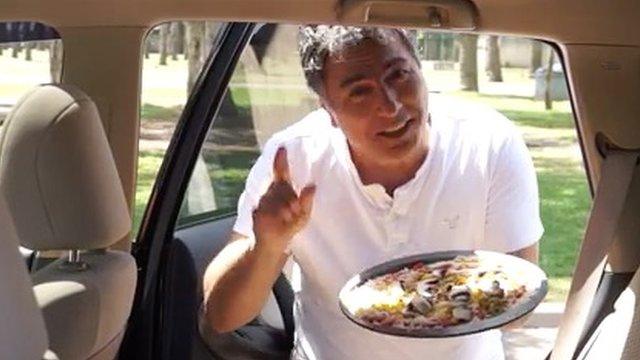Hot car death dad says new safety rules not enough
- Published
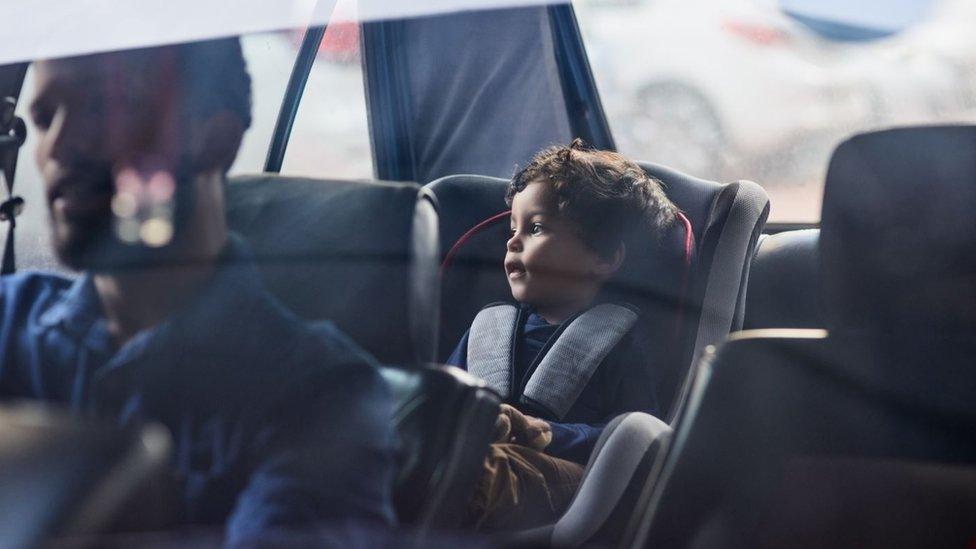
Manufacturers in the US have agreed to add rear seat reminders to new cars in a bid to prevent children dying of heatstroke in vehicles.
The audio and visual cues for motorists to check their back seats are to be installed in all new vehicles by 2025, car-makers announced.
But campaigners, including a father whose son died in a hot car, argue the industry is not going far enough.
Last year saw the highest number of hot car deaths in two decades.
Fifty-three children died in the US after being left or trapped in cars in 2018.
In more than half the cases in the 20 years up to 2018, an adult reported forgetting that a child was in the car.
So far this year, there have been 39 such deaths, according to KidsAndCars.org, which tracks the numbers. The most recent was reported in Arizona on Tuesday, external, when a three-year-old girl was left in her father's car.
More than 800 children died from heatstroke in parked cars in the US from 1998-2018.
Miles Harrison knows how those families feel. Eleven years ago, he accidentally left his baby son Chase in his car outside work in the Washington DC suburbs, thinking he had dropped the boy off at daycare.
Chase's death came just months after he had been adopted from Russia by Mr Harrison and his wife Carol. It was only a week into his new routine of going to daycare that he died, his parents having previously taken three months off work to care for the 18-month-old.
"This system doesn't detect anything," said Mr Harrison. "You could have a watermelon on the back seat. It doesn't detect that there is a living being there."
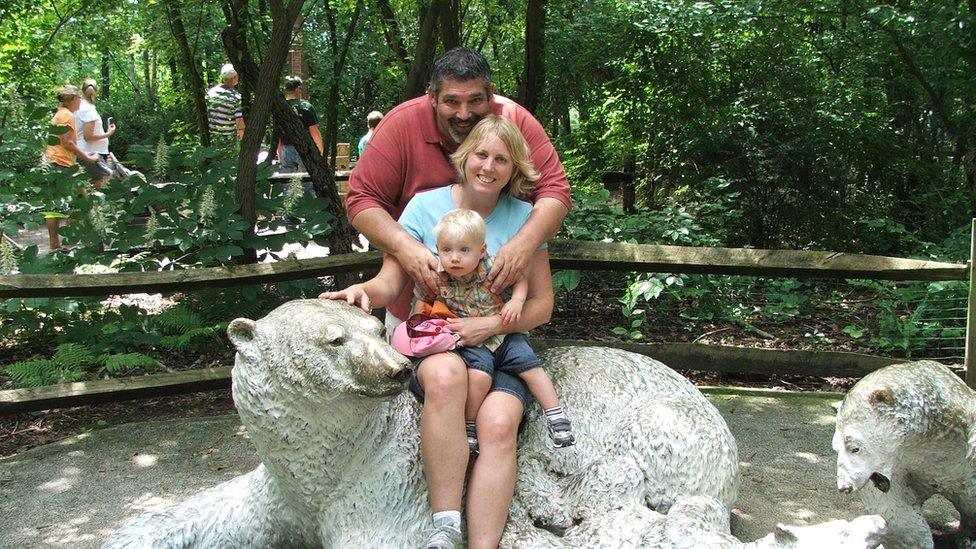
Miles Harrison with his son Chase and wife Carol
The rear seat reminder systems were announced by two US-based industry groups, the Alliance of Automobile Manufacturers and the Association of Global Automakers, on Wednesday.
The technology remembers if the rear doors have been opened before a journey, giving a reminder when the journey ends and the driver gets out.
The car organisations said, external it was "one part of an overall effort to help reduce the number of times that children are left alone in a vehicle", adding they wanted "increased public awareness concerning the dangers of leaving children unattended".
There are 20 manufacturers taking part, representing nearly 98% of all US vehicle sales.
Mr Harrison, of Purcellville, Virginia, said the new system would not have made a difference in his case.
That's because it sounds an alert when the back door has been opened ahead of a journey. In his case, he stopped at a dry cleaners on the way to work that day in July 2008, so the system would have been disabled when he got out of the car briefly.
"If you make a stop on the way, the system is useless," he said. "Then you get distracted, and you go to work. Which is what happened."
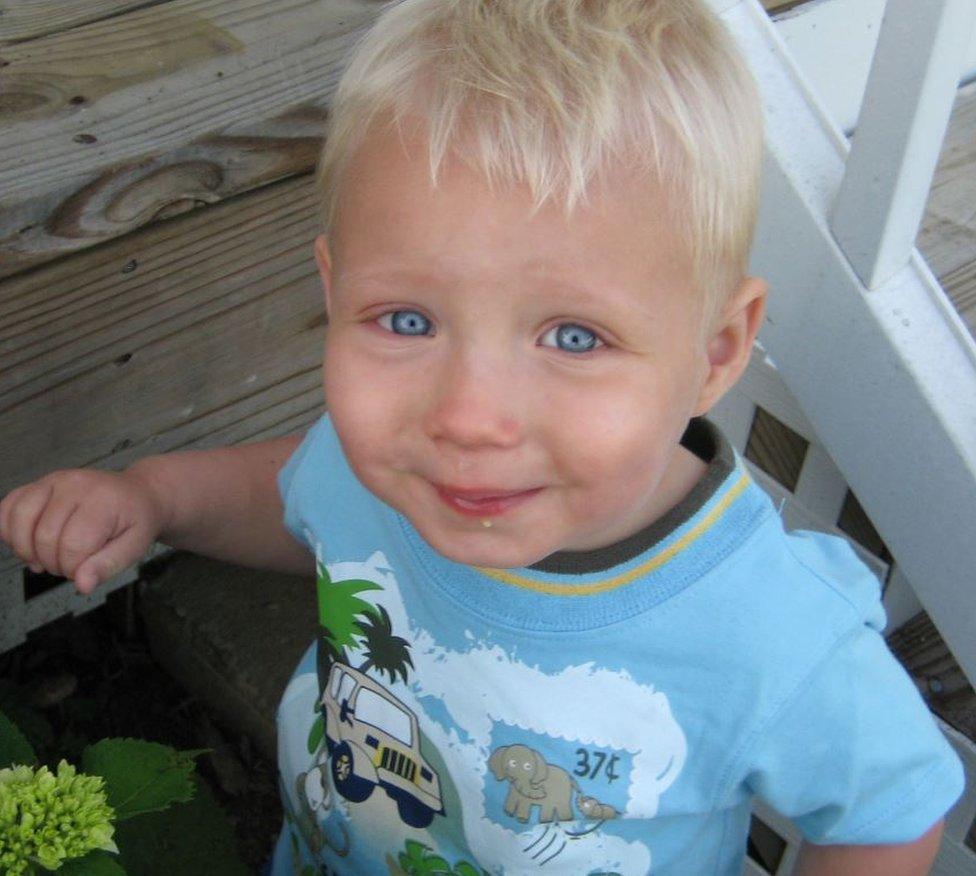

Chase was in the hot car all day while his father was at work, until a colleague asked if Mr Harrison had "a doll" in his car.
"At first I didn't understand and then my mind started racing, I started to feel sick, ran out to the car, opened the door and there was my beautiful son, Chase, lifeless still in the car seat," Mr Harrison has said in a previous account of the incident, external.
"I pulled him out of the car, screaming hysterically and carried him to the office, where my boss started CPR on him and 911 was called. The paramedics worked on him in the office but to no avail, my son had died in the hot car."
The interior of a parked car can heat up by 10C (18F) in just 10 minutes. When the human body reaches temperatures above 40C (104F) the organs are at risk, but children are vulnerable because their bodies heat up three to five times faster than an adult's.
Mr Harrison and other campaigners want car manufacturers to detect motion in the back seat, something that some new vehicles already have as a feature.
"All they're doing is putting off legislation that would make them actually do something," he said. "There's no oversight and there are no consequences. It's just gobbledygook.
"They're trying to sell cars, not save lives."
'I am those people'
Joan Claybrook, former administrator at the National Highway Traffic Safety Administration, agreed. She said: "This is an outrageous attempt by the automakers to avoid an enforceable safety standard.
"They should have added detection systems to their vehicles decades ago when auto manufacturers told all parents to move their children to the back seat due to the decision of some auto makers to install overpowered airbags."
Mr Harrison was buying a new car recently with wife Carol and his daughter, eight, when she got into the back of a vehicle in the showroom. "The sales guy got two steps away, and it started blowing its horn. It scared the crap out of me, it was so loud," he said.
"It had detected my daughter was in the car, and the door was closed. I turned around and started to cry - my wife knew why. And then I bought that car."
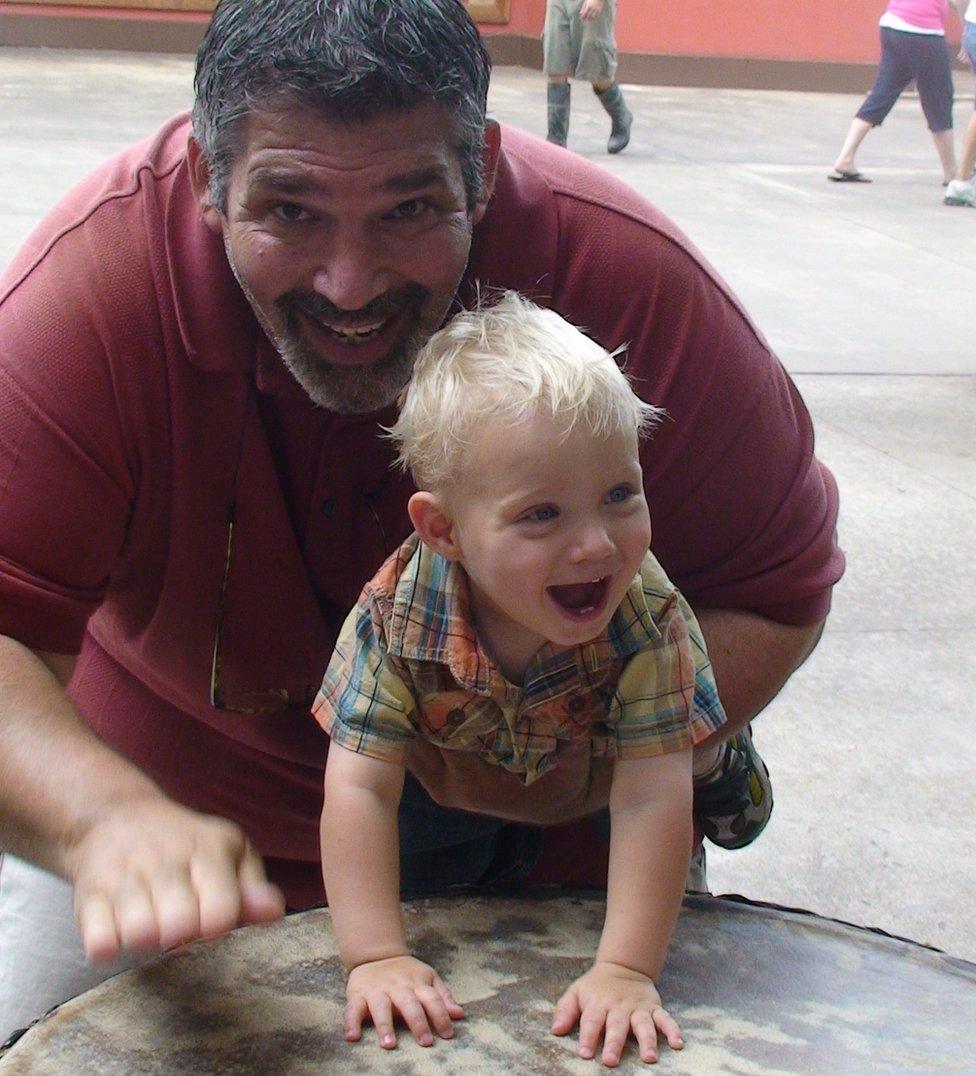

He says he is all too aware that people can't understand how any parent could leave their child in a car, forgetting them for hours.
"I am those people," he said. "When this happened to me, people wanted to kill me. They make you a monster, because if they demonise you it means it can't happen to someone like them.
"It can happen to anyone, though, from any background. It's when there's a new routine, maybe you're sleep-deprived, and you go into auto-pilot.
"I hope they never have to walk in my shoes. If they want to think I'm a terrible person, I'm OK with that. But it could happen to anyone. Please don't be overconfident.
"I desperately pray that reading about this will make just one person save their child's life. That's all I would ever need. Don't do to your family what I did to mine, I'm begging you. I'm a man who made a terrible mistake."
He was taken to court for that mistake, and found not guilty of involuntary manslaughter.

Tips on keeping children safe in cars
Keep a teddy bear in the car seat when it's empty, then when you put your child in the seat, move the toy to the front seat
Put a shoe or mobile phone in the seat with your child
Put the car seat on the passenger side of the back seat
Look in the front and back seats when you lock the car
Ask your partner to call to check you dropped your child off at nursery
Source: Kids Safe Worldwide

He and his wife are supporting the Hot Cars Act, external, which would require cars to have the technology to detect an occupant.
It's also backed by campaign group KidsAndCars.org.
Its founder Janette Fennell said: "This is a voluntary agreement. And it's not enforceable.
"I've seen this technology - it comes up with a dashboard warning, but I know I don't look at mine when I get out of the car.
"You need technology that can detect the presence of a child or any other living being. We have alerts to check tyre pressure, for a dead battery, for keys in the ignition, but not for a child."
Ms Fennell also said the new system would not make a difference in the one-third of hot car deaths where a child has, unbeknownst to an adult, got into a parked car and become trapped inside.
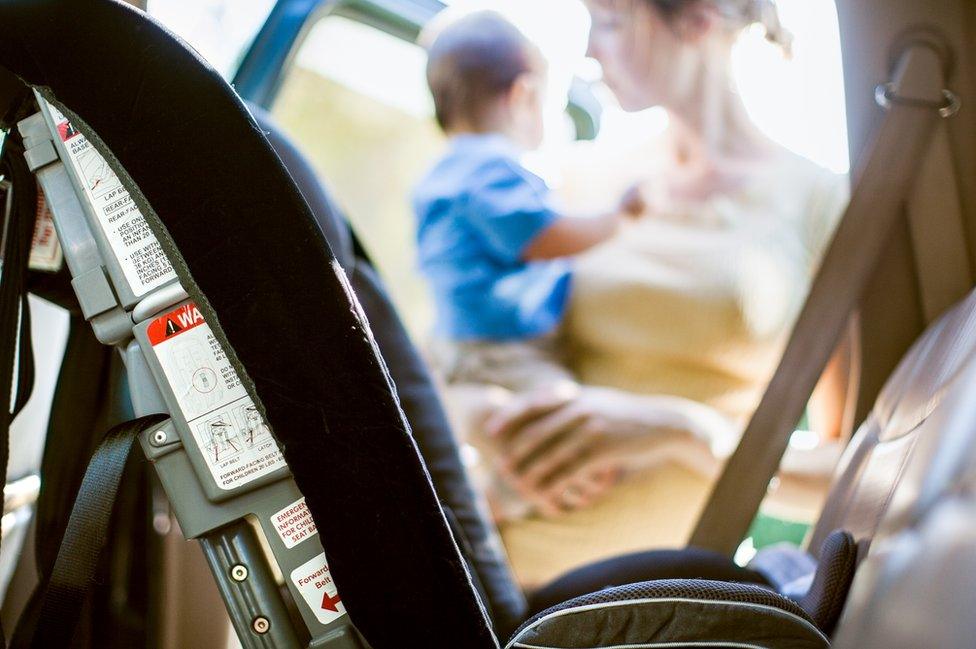
In many cases, the child has been in a rear-facing car seat - which is designed to be safer, but means they are out of an adult's line of sight

"And the biggest mistake anyone could ever make is to think it couldn't happen to them," she said. "This is just how our brains work. We have habit memory, also known as autopilot, and it takes the simplest thing for it to kick in. It can even cause false memories.
"When you're saying 'this could never happen to me', you're saying 'I'm not human.'"
She said she had been told of a father putting his baby twins and another child into his car. He was ready to drive off when his wife screamed at him to stop - he had left one of the twins, in the car seat, on top of the vehicle.
"People can relate to leaving their coffee on top of a car, or their piece of paper in the copy machine," she said. "That's how quickly it can happen."
- Published22 July 2014
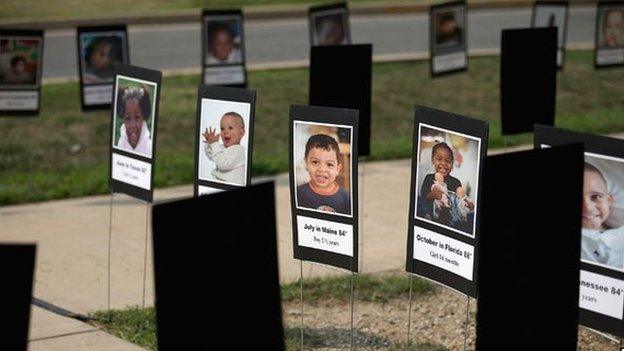
- Published4 June 2015
